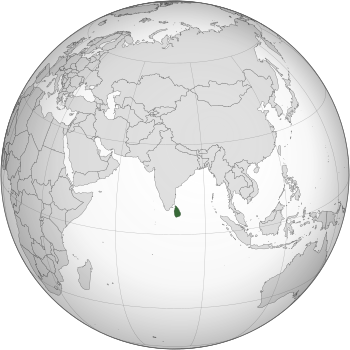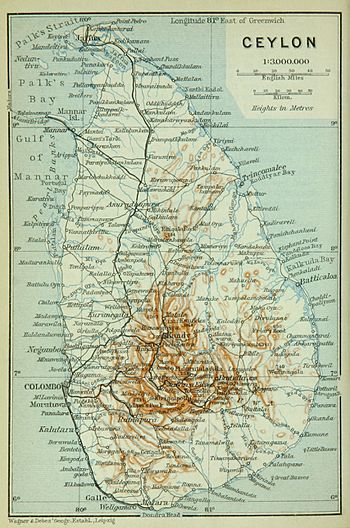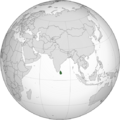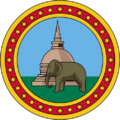British Ceylon facts for kids
Quick facts for kids
Ceylon
|
|||||||||||||
|---|---|---|---|---|---|---|---|---|---|---|---|---|---|
| 1815–1948 | |||||||||||||
 |
|||||||||||||

British Ceylon, ca. 1914
|
|||||||||||||
| Status | British Colony | ||||||||||||
| Capital | Colombo | ||||||||||||
| Common languages | English (Official), Sinhala and Tamil |
||||||||||||
| Government | Monarchy | ||||||||||||
| Monarch | |||||||||||||
|
• 1815–20
|
George III (first) | ||||||||||||
|
• 1936–48
|
George VI (last) | ||||||||||||
| Governor | |||||||||||||
|
• 1798–1805
|
Frederick North (first) | ||||||||||||
|
• 1944–48
|
Sir Henry Monck-Mason Moore (last) | ||||||||||||
| Prime Minister | |||||||||||||
|
• 1947–48
|
Don Stephen Senanayake | ||||||||||||
| Legislature | Legislative Council (1833–1931) State Council (1931–47) Parliament (1947—48) |
||||||||||||
| Historical era | British Ceylon period | ||||||||||||
|
• Kandyan Convention
|
5 March 1815 | ||||||||||||
|
• Independence
|
4 February 1948 | ||||||||||||
| Area | |||||||||||||
| 1881 | 65,610 km2 (25,330 sq mi) | ||||||||||||
| 1891 | 65,610 km2 (25,330 sq mi) | ||||||||||||
| 1901 | 65,610 km2 (25,330 sq mi) | ||||||||||||
| 1924 | 65,992 km2 (25,480 sq mi) | ||||||||||||
| 1946 | 65,610 km2 (25,330 sq mi) | ||||||||||||
| Population | |||||||||||||
|
• 1881
|
2,759,700 | ||||||||||||
|
• 1891
|
3,007,800 | ||||||||||||
|
• 1901
|
3,565,900 | ||||||||||||
|
• 1924
|
4,574,550 | ||||||||||||
|
• 1946
|
6,657,300 | ||||||||||||
| Currency | Ceylonese rixdollar (1815–28) British pound (1825–71) Ceylonese rupee (1872—1948) |
||||||||||||
|
|||||||||||||
| Today part of | |||||||||||||
|
Source for 1924 area and population:
|
|||||||||||||
Ceylon was the name for Sri Lanka when it was a British colony. This period lasted from 1815 to 1948. At first, the British only controlled parts of the island. But by 1817, they ruled the entire island. Today, this island nation is known as Sri Lanka.
Contents
What Was British Ceylon?
British Ceylon was a Crown colony under the control of the United Kingdom. It was a very important part of the British Empire. The capital city of Ceylon was Colombo.
How Ceylon Became British
The British took control of Ceylon in stages. In 1815, they signed the Kandyan Convention. This agreement gave them power over the Kingdom of Kandy. Kandy was the last independent kingdom on the island. After this, the British ruled the whole island.
How Ceylon Was Governed
Ceylon was governed by the British Monarch. The King or Queen of Britain was the head of state. A Governor was sent to rule the island. The first Governor was Frederick North. The last was Sir Henry Monck-Mason Moore.
The island also had its own law-making bodies. These included the Legislative Council and the State Council. Later, a Parliament was formed. These bodies helped manage the colony.
Life in British Ceylon
During British rule, English became an official language. However, Sinhala and Tamil were also widely spoken. The currency changed over time. It started with the Ceylonese rixdollar. Later, the British pound was used. Finally, the Ceylonese rupee became the main money.
The population of Ceylon grew a lot during this time. For example, in 1881, about 2.7 million people lived there. By 1946, the population was over 6.6 million.
Gaining Independence
Ceylon remained a British colony for 133 years. On February 4, 1948, Ceylon gained its independence. This marked the end of British rule. It became the Dominion of Ceylon. Later, it changed its name to Sri Lanka.
Images for kids
See also
 In Spanish: Ceilán británico para niños
In Spanish: Ceilán británico para niños
 | Emma Amos |
 | Edward Mitchell Bannister |
 | Larry D. Alexander |
 | Ernie Barnes |







